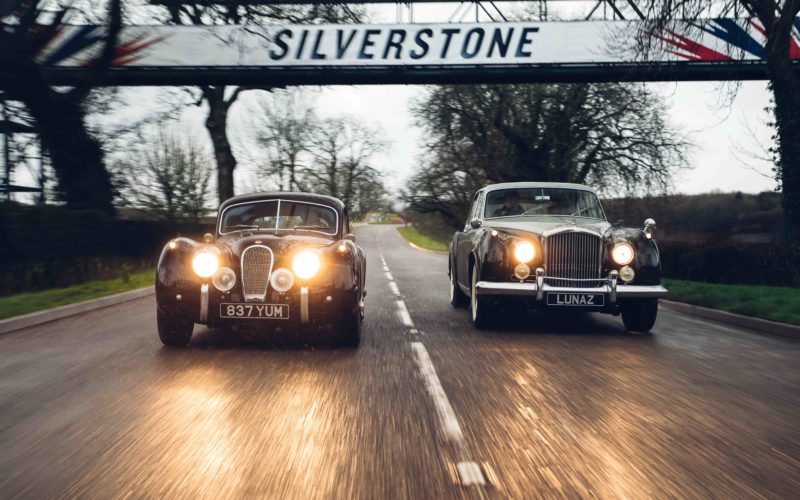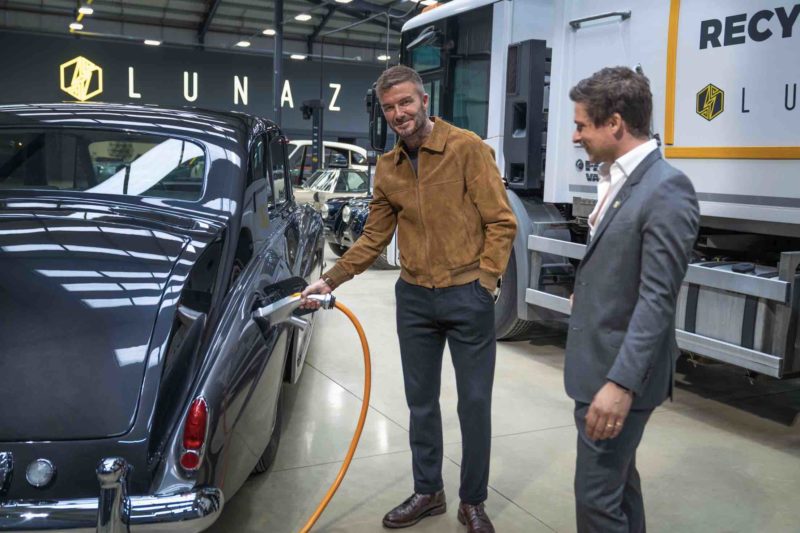Former British soccer star David Beckham has invested in Silverstone-based vehicle electrification company Lunaz, which has made a name for itself of late by upcycling and electrifying classic motor vehicles such as classic Range Rovers and Rolls-Royce Phantoms and Silver Clouds.
Lunaz has established itself as a leader in the electrification of some of history’s most recognisable and celebrated vehicles. Having developed their own proprietary electric powertrain, Lunaz has been able to bring to market the first fully electric versions from Range Rover, Bentley, Rolls-Royce, and Jaguar.
In 2020 alone, Lunaz completed the re-engineering process for a 1961 Rolls-Royce Phantom V and a Rolls-Royce Silver Cloud – which Lunaz started selling for £500,000 and £350,000, respectively. Lunaz also announced in December plans to convert 50 classic Range Rovers using their electric powertrain.
Unsurprisingly, Lunaz has been the subject of significant customer and critical acclaim. For example, the company’s electrified 1961 Bentley Continental Flying Spur awarded by BBC Top Gear in its ‘Electric Vehicle Awards’ issue.
Considering, however, that the company only began production of its first cars in 2019 – which of course ran headlong into the global COVID-19 pandemic – Lunaz’ rising popularity speaks volumes.
As does the involvement of former Manchester United and Real Madrid midfielder and English national team captain David Beckham, who has taken a 10% stake in Lunaz.
“Lunaz represents the very best of British ingenuity in both technology and design,” said Beckham.
“I was drawn to the company through their work restoring some of the most beautiful classic cars through upcycling and electrification. David Lorenz and his team of world-class engineers are building something very special and I look forward to being part of their growth.”
Beckham was joined by the prestigious Barclay family – who, amongst their many holdings, own The Telegraph Media Group – and the property billionaire Reuben family, and Alexander Dellal.
More than simply serving as a way to electrify expensive classic vehicles, however, Lunaz believes its electrification process is an important avenue through which to extend the lifespan of vehicles that may otherwise have been out-and-out replaced.
“By 2030, when the UK ban on internal combustion engine car sales will come into effect there will be 2 billion ICE vehicles on the planet,” said David Lorenz, Founder, Lunaz.
“Without conversion to electric, this will represent mass redundancy of finite resources that could otherwise be re-used. Our approach answers the urgent need to extend the life of these vehicles for future generations.”
In this same vein, Lunaz will use this most recent influx of cash from their new investors to launch plans to expand its offerings beyond luxury classic vehicles. Specifically, Lunaz will now begin to electrify and upcycle industrial vehicles on a mass global scale, starting with heavy goods vehicles (HVGs) including refuse trucks.
According to Lunaz, the remanufacturing and electrification process of industrial vehicles will extend the life of up to 70% of the existing weight and embedded carbon within a vehicle and is expected to also save fleet operators significant costs compared with replacing existing vehicles for new ones.
For example, according to Lunaz, a municipal authority could save over 43% in the Total Cost of Ownership of an upcycled and electrified refuse truck, as compared with replacing their existing fleet with new equivalent electric vehicles.
“The upcycling of existing passenger, industrial and commercial vehicles presents a sustainable alternative to replacing with new,” said Lorenz.
“Our approach will save fleet operators capital while dramatically reducing waste in the global drive towards de-carbonisation. There is evidence everywhere in the global economy that responsibility and commerciality are no longer mutually exclusive. This top tier investor commitment is testament to Lunaz’ path to defining the market for remanufacturing and conversion to clean-air powertrains.”
Joshua S. Hill is a Melbourne-based journalist who has been writing about climate change, clean technology, and electric vehicles for over 15 years. He has been reporting on electric vehicles and clean technologies for Renew Economy and The Driven since 2012. His preferred mode of transport is his feet.



